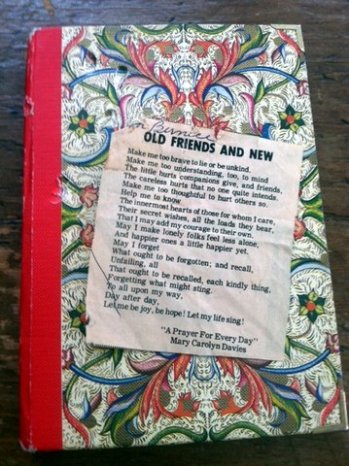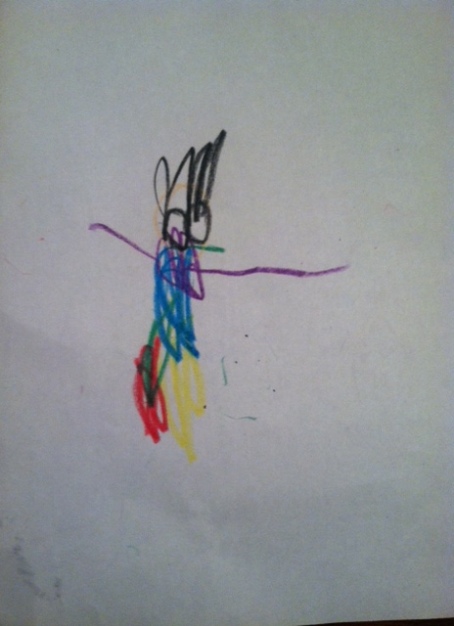I am not, for the moment, living in the real world. I am staying with my father, in the house in which I was raised, as he recuperates from an illness. He requires tube feedings, and is on a regimen of blood thinners that make it dangerous for him to live alone in his temporary state of weakness and physical instability. This is not an act of martyrdom; I love him fiercely, and it would be unconscionable to let him be alone at a time when he is both ill and grieving the loss of my mother. I am lucky that I can do this thing without quitting a job, and lucky that my own household is willing to adapt to this strange cross-town family arrangement for a while.
Life goes on at my “real” house, and in the rest of the world. My son went on a vacation with a friend, and returned to school. My husband works, does the laundry, keeps the house clean and comes to this house to share meals with me and bring our dogs for visits. I see on Facebook that other people are going to basketball games, trying new kinds of sushi, and going to the gym.
Here, I live on a schedule that is not my own, making no plans more serious than a one-hour outing to stock up on Greek Yogurt and whole grain pita chips. Every day I wake at 7:00 for the first of five feedings, one every three hours. I grind up pills with a mortar and pestle, and dilute them in water that is not too cold or too hot. I change dressings. For a while I was giving two daily injections, a thing at first terrifying and then a point of pride. The phone rings all day long – friends of the family inquiring about dad, doctor’s offices, and the bustling home health care outfit that sends to us speech therapists, physical therapists, nurses and aides. Nothing is about me, which is oddly fine.
Every morning I watch “Charmed” reruns and drink my coffee. I make myself a pot every few days and drink it cold until the day when the pot is down to sludge. I read voraciously. Sometimes I try to write. I tend to the Corgi who still misses my mother, and regards me with visible disappointment. Sometimes I don’t take a shower, and I almost never put on any makeup.
At 11:00 I give dad his last meds, and settle myself on one of the couches in the beautiful, windowed room they added to the house after I “grew up.” I look for the moon through the triangular windows under the eaves, and I talk to my mother who is everywhere in this house from her cookbooks to the pressed table linens. I text my husband and son, trying to be in touch without disturbing them, trying not to be too alert to the distance I have travelled from my home, a distance far greater than the real, practical couple of miles that separates me.
It isn’t difficult to avoid alertness here, in this cocoon of busy-ness and suspended time. I am lulled by the routine, and by the constant emphasis on “support” and “caring” radiated by the parade of paramedical folks on the phone and at the front door. It is a sharp intrusion when I have to tend to my real, actual work, or when I get a call from my “real” house asking if I know where something or other got put. It’s like the shaking that jars one from a deep and satisfying sleep. Am I not doing enough already? Isn’t there someone else who can do whatever it is, find the thing, fix the problem? I am not confident in my ability to move between my twilight world and that other, louder, brighter, faster world quite yet. I am exhausted, a little, by the prospect of doing my hair, driving my car, interacting with people unaware of my breach with their universe.
This twilight period is not a bad thing for me, of that I am sure. My father, sick and grieving, is still himself in every way that matters. I promised my mother that I would look after him, and there is rightness to this, despite all the oddness, and disruption. Yesterday I asked him about a Renaissance Florentine philosopher mentioned in the novel I’m reading, and he responded with a Yeats poem about the man in question. How could I abandon such a man to an army of high-pitched squealers who know nothing about his mind, his heart, his essence as a gentleman and a scholar? How could I live the rest of my own life knowing that when he most needed an ally and a loving heart, I left him to people who would categorize him as a “cute old guy” and call him “Mr. Edward” as they wheedled and cajoled him to do his exercises?
A few nights ago, as I bent over him at the end of a feeding, my father told me I looked sad. “I’m sorry,” he said, “I feel like I’ve let you down if you need to talk about your mother. Would you like to do that?”
“Well,” I said, “if you want to…?” He shook his head. I tucked him in and kissed the top of his head. In this drifting, dreaming twilight world of routine and comfort, she is with us all the time. We don’t need to talk about her as if she weren’t here.
When it’s time to wake up and move briskly back into the crackling tumult of real life, she may recede. But she may, like the downy feathers left by dreams, stay with us, and float across our cheeks when we need her most.


![ashtabula[1]](https://imagineannie.wordpress.com/wp-content/uploads/2009/11/ashtabula1.jpg?w=500&h=321)